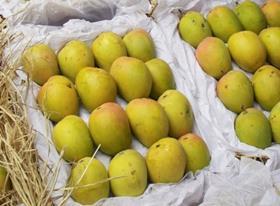
India’s Agricultural and Processed Food Products Export Development Authority (Apeda) has called on exporters to commit to mango shipments to Japan in order to boost exports.
With shipments of Indian mangoes to Japan declining significantly during the past two years, Indian mango exporters have written to Apeda requesting that the export authority bear the brunt of expenses for Japanese quarantine official to visit India to inspect vapour heat treatment of mangoes.
“Apeda will bear 90 per cent of the expenses incurred for stationing of quarantine inspection for the year 2014,” Apeda said in a statement released on 16 February. Apeda has said it will bear the costs, decreased to 50 per cent in subsequent years, on the proviso that exporters commit to export volumes.
Apeda has asked for a commitment of a minimum of 50-70 tonnes of mango exports to Japan in 2015, increased to 100 tonnes in 2016 and 150 tonnes in 2017.
“A written consent from exporters indicating a minimum quantity of mango exportsto Japan is needed by February 26 so that it can be forwarded for approval from the Japanese quarantine authority for their visit,” R Ravindra, Apeda’s deputy general manager, told the Business Standard.
All mango shipments to Japan must undergo vapour heat treatment in India, with a minimum of 5 per cent of shipments being inspected by both Indian and Japanese officials.
A ban on Indian mango shipments to Japan was lifted in 2006, though export volumes have remained small. India’s overall mango exports decreased in 2014 compared to 2013, with its major market the United Arab Emirates, followed by Bangladesh, according to the International Trade Centre.



